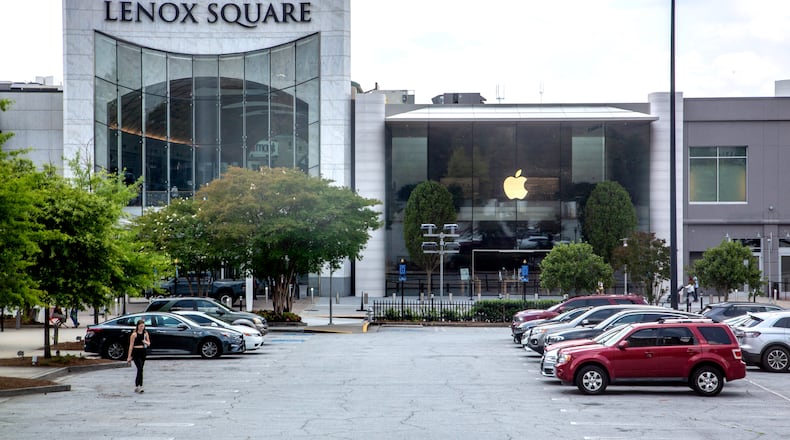In the wake of several shootings, including one involving two teens, Lenox Square will begin requiring visitors under 18 to be accompanied at all times by an adult.
A Wednesday afternoon news release detailed the new policy, which is called the “youth supervision program.” Any youth will have to be accompanied by their parent or an adult who is 21 or older after 3 p.m. each day, starting September 21.
The change comes after a violent two years for the mall, a premier retail destination in the heart of Buckhead. Lenox has struggled to maintain its reputation for posh shopping due to a string of headline-grabbing shootings and assaults.
Two shootings took place on Lenox Square property over the summer after 3 p.m., one of which involved two 15-year-olds. Rising crime in Atlanta’s richest neighborhood has reinvigorated an effort to make Buckhead its own city.
“The program is in response to feedback from the community and community leaders, as the center reinforces its commitment to the community to provide a pleasant, family friendly shopping environment,” the mall’s release said.
The news came as a shock to 17-year-old Amy Nguyen, who came to the mall with her friend after school Wednesday. She said the requirement to have a parent present will limit her freedom.
“I always just want to be with my friends at the mall,” Nguyen said. “I just don’t really like that. High school people are not that young. They should be able to do what they want. We just want to hang out.”
Maria Torres, a 20-year-old sales lead at clothing retailer Aerie, said she has “mixed emotions” about the ban. Having worked with the store since she was 16, Torres said she can understand how this could affect employees, but also believes the ban will address some crime within the mall.
“In a way, I feel like it’s good because sometimes kids do try to steal,” Torres said. “But for the most part, it’s kind of like snatching away that liberty when they’re in high school.”
Sense of safety
In 2020, Lenox Square was the site of at least six shootings, including a March homicide that killed a Tennessee man, according to police. Arrests have been made in the majority of those cases.
The incidents prompted further security measures, including a weapons detector installed in December at the mall’s main entrance. The Atlanta Police Department has also opened a mini-precinct inside the mall.
On June 13 this year, two teenagers attempted to rob a Lenox Square security guard after mall hours and then shot him, leaving him critically injured, Atlanta police said. The 15-year-old suspects, a boy and a girl, were arrested and charged with criminal attempt to commit murder and a slew of other charges. Police have not released their names.
Two months later, a man told police he had been shot near a mall parking garage about 6 p.m. by someone who left the area in in a dark-colored sedan. Investigators said it appeared the man had been targeted. There were at least nine other shootings at Atlanta area malls this year.
“Anything that any project, including Lenox Square, can do to make the customers feel comfortable and safe would be to the benefit of the mall,” said attorney Abe Schear, a partner in real estate and leasing practices for Arnall Golden Gregory and not affiliated with Lenox. “Ultimately, the mall would enjoy better business.”
Atlanta Mayor Keisha Lance Bottoms, who has faced criticisms over the city’s rising crime rate since 2020, lauded the mall’s actions in a statement.
“The engagement and care of young people remains a top priority for our Administration. We welcome responsible efforts by the business community to ensure the wellbeing of Atlanta’s residents and visitors — especially our young people,” Bottoms said.
In July, Bottoms said people under the age of 16 committed 10% of the city’s violent crimes. Bottoms wants to invest $70 million into public safety efforts that include the creation of an office of violence reduction. Those funds would also support the establishment of youth councils and city meetings with teachers, principals, and parents.
Members of the Atlanta City Council, many of whom are running to succeed Bottoms as mayor, were in a meeting Wednesday and could not immediately respond to requests for comment.
Balancing business and security
Once Lenox Square’s supervision policy takes effect later this month, mall employees younger than 18 may continue to work after 3 p.m., but they must be accompanied by an adult or parent when their work shift ends. One adult may accompany up to four youths.
“Adults are responsible for the actions of all of the youth they accompany,” the policy said.
The mall, which is owned by Simon Property Group, said patrons may have to show proof of age during the policy’s hours. Individuals who don’t have acceptable identification, such as a driver’s license, ID card or passport, will be denied entry to the mall or asked to leave the property. A spokesperson for Lividini & Co., a brand management consultant for Lenox Square, declined to comment further about the policy.
This approach to stop unsupervised teens is not unprecedented. Since 2009, the Mall at Stonecrest in south DeKalb County has enforced a similar policy, the “parental involvement program,” after 4 p.m. Atlantic Station, the mixed-use development in Midtown, also has a similar youth supervision policy that’s active after 6 p.m. each day.
While Mickey Hopkins, a store manager at teen clothing store Aeropostale, said he has noticed rising concerns about crime in the area, he does not believe teenagers are the problem. He said the new policy will hurt businesses that are simply trying to make it through the COVID-19 pandemic.
”Not allowing teenagers in the mall without an adult is ridiculous,” said Hopkins, who has worked at the retailer for 11 years. “We’re a teen retailer, so that’s a big part of our business. … Most parents or adults don’t want to come to the mall on a Tuesday at 4 p.m. Traffic in the mall is already down, so limiting who can come in the mall after the same time doesn’t make sense.”
Hopkins pointed to other strategies the mall should consider instead, saying Lenox could increase police visibility or move its metal detectors before restricting teenagers’ access.
Schear said he doesn’t expect the new restrictions on young shoppers to negatively affect many businesses, if any.
“Most of the tenants that are at Lenox Square are quality tenants that understand what’s going on there,” he said. “They are certainly not at a discount price point, and I would think that any loss of sales for the few tenants that are there for younger people would be more than offset by the increased sales by the higher-end tenants.”
To view the full policy, visit simon.com/youthpolicylenoxsquare.
— AJC staff reporters Alexis Stevens and J.D. Capelouto contributed to this report
What is Lenox Square’s supervision policy?
• Patrons under 18 must be with a parent or adult, 21 or older, at all times after 3 p.m.
• Shoppers may be asked to provide identification, such as a driver’s license, ID care or passport, to show their age.
• One adult may accompany up to four youths.
• Store employees under 18 may continue to work after 3 p.m. However, once their shift is over, they need supervision.
The Latest
Featured





